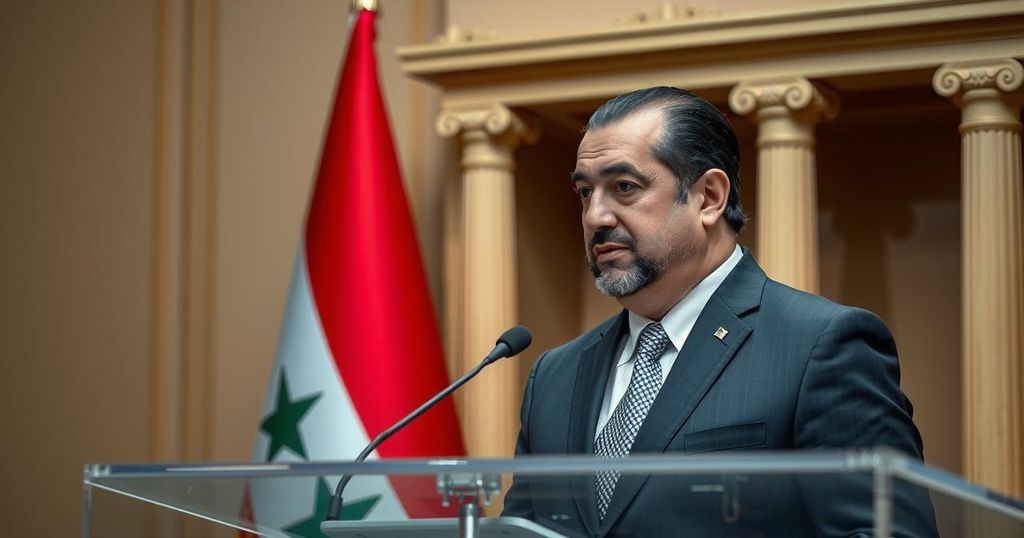Turkey’s Strategic Gains in Post-Assad Syria

The fall of Assad has bolstered Turkey’s influence in Syria as evidenced by high-level diplomatic visits and strategic partnerships, particularly with Turkey’s spy chief meeting newly established Syrian leadership. This shift allows Turkey to pursue its interests in the region while managing internal dynamics regarding Syrian refugees. Erdogan’s administration is leveraging this opportunity to shape future Syrian policies.
Following the swift fall of Syrian President Bashar al-Assad, Turkey’s recent diplomatic maneuvers in Syria signal a significant shift in regional power dynamics, marking Ankara as a prominent beneficiary of the upheaval. Turkey’s spy chief, Ibrahim Kalin, was welcomed in Damascus—an extraordinary development that followed a twelve-year hiatus. Kalin’s visit, characterized by political theatrics, underscored Turkey’s renewed influence amidst a changing government landscape.
Dareen Khalifa from the International Crisis Group described Kalin’s trip as “a victory lap,” suggesting that Ankara’s stance throughout the Syrian conflict has proven strategic and timely. As Turkey navigates the complexities of its relations with groups like Hayat Tahrir al-Sham (HTS), analysts believe Ankara intelligently bided its time before re-engaging with Syrian leadership, which could provide fertile ground for its regional ambitions.
Despite Erdogan’s efforts for a peaceful resolution with Assad, negotiations unraveled as Syrian military aggression continued. The subsequent approval of HTS’s offensive further entrenched Turkey’s role as a ‘kingmaker’ amidst shifting allegiances. The dynamics of Turkish-backed rebel groups overtaking U.S.-aligned Kurdish forces in northern Syria emphasize Turkey’s broadening influence in the area.
The fall of Assad has also strategically benefited President Erdogan domestically, allowing him to project an image of a protector of displaced Syrians while catering to nationalist sentiments within his coalition. Notably, Turkish Foreign Minister Hakan Fidan’s announcement of support for rebuilding Syria signaled optimism in the Turkish construction and cement sectors, reflecting the intertwined fates of these roles.
In the new post-Assad context, Turkish officials aim to form alliances that preclude Kurdish autonomy in northeastern Syria while simultaneously aiding HTS through reconstruction efforts—as the group seeks international legitimacy. Thus, Turkey’s current posture within Syria positions it as an essential player in the region’s ensuing political landscape.
The geopolitical landscape in Syria has shifted dramatically following the ousting of President Bashar al-Assad, creating new opportunities for regional stakeholders. Turkey, having long played an active role in the Syrian conflict, is now positioned to expand its influence and strategic objectives. The interplay between Turkish-backed forces and Iranian and Russian interests underscores the complex challenges and opportunities in post-Assad Syria. Erdogan’s government seeks to balance domestic concerns regarding Syrian refugees with its foreign policy goals, reinforcing its status as a crucial participant in Syria’s reconstruction and stability.
In conclusion, Turkey’s strategic positioning following the fall of Assad reflects a significant transformation in both its regional influence and domestic policy approach concerning Syrian refugees. President Erdogan’s balancing act demonstrates both the potential and pitfalls of Ankara’s newfound leverage in Syria, as it navigates complex alliances with local factions. The unfolding events suggest a dynamic interplay between reconstruction efforts and geopolitical maneuvering, underscoring Turkey’s critical role in shaping Syria’s future.
Original Source: www.theguardian.com








